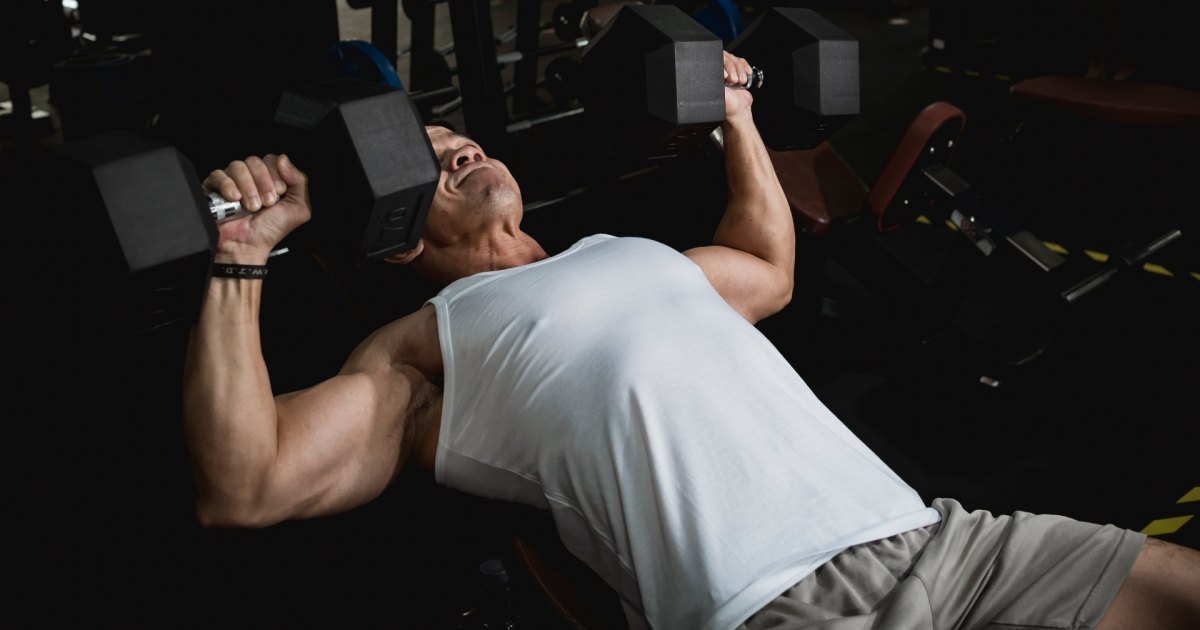No products in the cart.
Fitness Tips
Best Hypertrophy Chest Workout | Men’s Journal
If you want to build muscle, it’s best to stick with tried and true methods—and hypertrophy training is one of them. Put simply, it’s training to make muscles grow larger, and the hypertrophy chest workout below will help you build a larger chest.
Hypertrophy 101
Any hypertrophy routine requires three key factors in order to deliver gains:
- Volume: This refers to the total number of sets (and cumulative reps) of work the muscle is exposed to in a workout or across several workouts.
- Intensity: The amount of loading a muscle takes on.
- Mechanical Tension: This refers to the muscle spending time under tension throughout its functional range of motion. Doing that requires looking closely at the muscle’s action within the body and prioritizing exercises that challenge the muscle through as much of its range of motion as possible.
For lifters who have a solid fitness foundation, the best way to achieve hypertrophy benefits is to zero in on different body regions one workout at a time, better known as isolation training. Using isolation training methods allows you to spend your entire time in the gym giving one muscle group the pump of its life. Done correctly—and supplemented with a healthy, protein-rich diet complete with a caloric surplus—your body will respond by making the muscle grow.
The hypertrophy chest workout described below applies this method to help you create major gains in your chest muscles.
Chest Hypertrophy Workout
- A. Flat Barbell Pin Press x 5 (three sets): To perform a pin press, place a bench in a squat cage with the safety pins positioned about three to four inches higher than chest level. Place the loaded barbell across the pins, and set yourself up under the bar so you’re ready to press the weight from the bottom up. Get tight and drive the weight up until your arms are fully extended. Pause for a moment, then lower the bar in a controlled motion and let it settle on the pins (don’t be afraid of a noisy impact). Pause again, and then perform your next rep. Rest two minutes between sets.
Starting with the pin press will expose the muscles and nervous system to some heavy weightlifting, which is perfect when you’re fresh at the beginning of the workout. It’s also a great way to release crucial hormones to aid muscle growth. - B1. Incline Dumbbell Press x 10
- B2. Incline Cable Flye x 12
Perform B1 and B2 together as a compound set. Rest 90 seconds between sets, and perform 4 sets total.
These two movements performed back-to-back make a compound set. They’re doubling up on the fatigue through higher rep ranges and no rest until the end of the second exercise. They also hit the chest in two ways: as an upper arm adductor (presses) and as a long-lever adduction from a fully stretched position (flye).
Speaking of flyes, the choice to use cables rather than dumbbells is a crucial one. Cables optimize the mechanical tension on your chest muscles because the force is constantly opposing the direction of the muscle fibers. That means at both the beginning and end of the flye pattern, the pecs will be under stress—that doesn’t happen with dumbbells. - C1. Bodyweight Dips x Max reps
- C2. Feet-elevated Pushups x Max reps
After the B1-B2 compound sets, your chest muscles will be fried. Then it’s time to pummel them using bodyweight. The great thing about the C1-C2 compound set is that it focuses on fatiguing both sections of the pectoralis muscles: The dips hit the sternal pectoralis (the “lower” portion of the chest), and the feet-elevated pushups hit the clavicular pectoralis (the “upper” portion of the chest). Going for as many reps as possible will pump the chest full of blood and also take the target muscles to failure under the safest possible circumstances.
Post Workout: Eat
Remember, if you want to grow, you have to help your muscles recover fully using the right nutrients. Your food choices and food frequency matter. In conjunction with this workout, focus on eating protein-rich foods and getting a calorie surplus (i.e. consuming more calories than you burn), and you’ll put yourself on the right track for gains.
For access to exclusive gear videos, celebrity interviews, and more, subscribe on YouTube!
Source link

